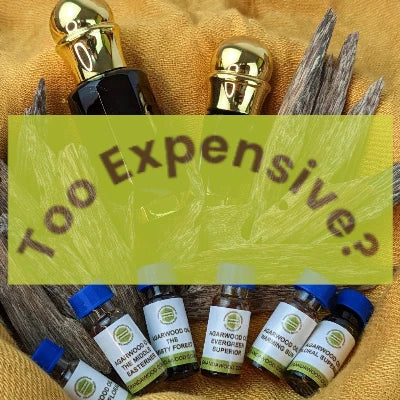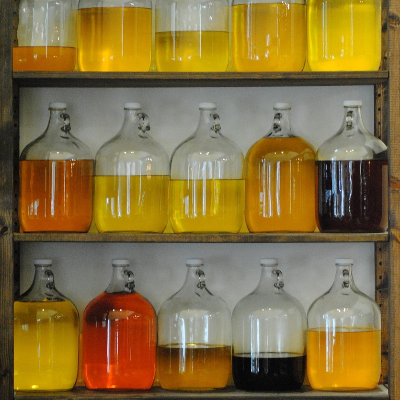Menu
-
-
F.A.Q
- How to identify genuine agarwood chip, natural or cultivated
- How to identify oil injection / absorption fake agarwood beads
- How to know if there are more than one oil in your oil
- How to make your wood bracelet or mala darker
- How to tell if an Agarwood bead sinks WITHOUT sinking it under water?
- How does back flow incense work and how do you burn it?
- Where to start if you don't know what agarwood is ?
- Why are you losing money if you buy seeds and plants?
- Which agarwood incense should I choose?
- Frequently Asked Questions
- Agarwood Related Articles
- Shipping
-
SHOP - Agarwood
-
SHOP - Other Fragrant Wood
-
SHOP - Incense Holder and Burner
-
- FREE Oud Oil guide
- Testimonials
- "Why did you buy this?"
- Contact us
- About Us
- +61430284329
- Login
-
English


You say: “Your Agarwood is too expensive”. Let’s Reason Together - about Price
February 14, 2024 8 min read
Table of Contents:[hide]
For those pondering the purchase of Agarwood oil, allow me to extend some advice regarding its pricing. My intentions here are not purely self-serving. Naturally, my hope is to have you experience the exceptional quality of our Agarwood oil. However, whether you decide in favour of our Grandawood Oil or another brand, I am confident in my ability to offer some suggestions. These suggestions originate from the experiences of buyers when they buy Agarwood.
First of all, Agarwood is not cheap, but you can still try it for under $100. As illustrated in the video below, you will understand why there is no cheap Agarwood.
Visit the plantation site and try Agarwood for free.
Did you watch the above video? So there is no “cheap” Agarwood.
That is why when buying 5 kg or above, the buyers usually visit the “factory” to see how the oil is produced, how the trees are cared for. And the most important thing is to try the products.
Purity can be tested in the lab, but seeing the oil being distilled in front of their eyes will improve their confidence in buying.
But not everyone can visit the “factory”.
Why?
Aquilaria trees, the trees that provide Agarwood are native in South East Asia (... and yes in Australia, Westcorp has sucessfully planted Aquilaria tree to produce Agarwood, made in Australia).
For those who do not live South East Asia, they need to fly to the countries where Agarwood are produced.
And this requires financial commitments.
Let’s say if the buyer is from the Middle East, Kuwait,he will need to fly to Ho Chi Minh City to visit us.
He needs to arrange his air tickets, accommodation and a schedule a time with us.
But not all buyers can go to our plantation site also, we also need to qualify them first as it takes our resources to organise visits too.
My point is: it takes a lot of time, energy and money to visit an Agarwood plantation site. But it is a well investment if the buyer is serious about getting their quality oil in large quantities.
But what if the buyer is a small business owner who does not have the resources to do all of the above?
Try a sample set
This option will be more economical than visiting the plantation. The sample set will be cheaper than your air ticket, let alone accomodation expense.
But before you try the sample set, you ask the seller a few questions to determine if he is who he claims to be:-- a knowledge oud seller. Below are some questions you can ask
- Where are you based?
- How is your oud distilled?
- What is your tree species?
- Can you show me some images of your Agarwood chips?
- How is your Oud smell?
- Is your Oud pure or blended?
In addtional, you can do a Google search on his name, his brand, and his customers' reviews.
Many people see Agarwood as an opportunity to make a quick buck, so overnight, they become sellers. Quite often, they do not have the knowledge of the products. They are only interested in your money. If you buy Agarwood from these sellers, you may get something else but not Agarwood.
There are sellers who are well-established but have no website. However, there are also sellers who have websites but limited knowledge. You just have to ask them a few questions above.
And so I say to you, first of all: Buy a real Oud oil.
Don’t look for the cheapest option. You are not merely spending the least money; you want the most for your money.
If a man is going to pay hundreds of dollars for an Oud oil, he surely is not so pressed for funds that he could not afford to add a bit more just to get him a really high-grade Agarwood oil - An Oud oil of genuine quality. In case he feels a bit of risky, he can always buy a sample set to try.
He can always ask the vendors (sellers) for a sample and the cost.
Get a sample set if you can, as the shipping is usually the same, whether 1g or 1kg.
Is the Agarwood sample free?
Some vendors may give you a free sample to try if you are at the factory or in a shop.
In Vietnam, where our plantation is. You can try some of the samples we have in the shop.
But with online stores, we cannot afford to give out something physically for nothing. Why?
Because the postage and handling is not free. Also, can I please ask:
- Do you judge a shipping company by its price per kg or by the speed of delivery without losing the package?
- Do you judge a music concert by the price of the ticket- or by the performance you see?
- Do you judge a restaurant by its cost in the menu or by the flavour and satisfaction it offers to your palate?"
- Do you judge a car mechanic by his price or by his service - get your car running- Free of problems?
- Do you judge a hotel by the rate per night -or by the service you get?
- Do you really want Iow price or the quality of your goods?
You cannot get something for nothing. You get exactly what you are paying for: Fine Oud OIl samples.
I am writing this not just for Grandawood but for other reputable vendors too. On rare occasions, when the vendors are new,they may give out free sample in a hope you will return for a big order. But after 10 x free samples without an actual order, I can bet the vendor will no longer give out free or he will go out of business.
See one sample below pure Oud below, it is $65 USD + $15 USD shipping = $80 USD (I have to censor some details as the customer asked me to)
You see, a customer is willing to pay $80 USD for 1 sample. He told me this was a fine Oud oil. So he is happy to get it for this price to try.

- You are getting 6 oud oils not 1 oud oil
- You are getting 0.5ml for each oil not 0.1 ml
- Only $114 USD Shipping included ($150 AUD Free shipping in Australia)

So what do you get for your money?
Fine Oud oils backed from the below.
Distilling high-quality Agarwood essential oil is an intricate blend of artistry and scientific precision, demanding rigorous attention to every detail throughout the process. Here are our essential requirements:
Hand Selection of infected Wood: The journey to premium Agarwood essential oil starts with selecting the right material: Agarwood. We only handpicked the resinous, most infected part of the Aquilaria trees are chosen, where the concentration of essential oil
Proper Extraction Techniques: The method of extraction is pivotal and must be tailored to suit the unique properties of the Agarwood. Water distillation remains the traditional method of choice. Additionally, we only use Supercritical CO2 to extract some Oud oil - a sophisticated alternative, offering a solvent-free method that preserves the oil's purity and aromatic profile while being environmentally friendly.
Controlled Extraction Parameters: Precision in controlling the temperature and pressure during extraction is critical. Deviations can lead to alterations in the oil's chemical makeup, reducing its quality and effectiveness.
Quality of Water: The quality of water used in steam and water distillation plays a significant role in the final product's purity. We filter our water to ensure that minimum external impurities compromise the essence of the Agarwood essential oil.
Clean and Well-maintained Equipment: The cleanliness of the extraction equipment is non-negotiable. Residues from previous batches can contaminate the oil, affecting its fragrance and purity. We use different apparatuses to distil some oils for their unique aroma. For example, stainless steel for Evergreen Superior, copper for Smooth Oud and Middle Easterner.
Expertise and Experience: The distiller's expertise is paramount in navigating the complexities of extracting Agarwood essential oil. A deep understanding of the nuances of each technique and the ability to adapt to the needs of different materials is what sets apart a high-quality oil. We have many trials and errors to improve the aromas. We know the temperature, the pressure and the time.
Post-Extraction Handling: Proper storage is crucial for maintaining the integrity of the Agarwood essential oil post-extraction. We also age the oil to enhance its aroma.
Sustainable and Ethical Practices: Agarwood oil production, including essential oil and supercritical extract, is not solely about the end product. Sustainable and ethical harvesting practices are vital for the preservation of Aquilaria trees and their surrounding ecosystems, ensuring the longevity and availability of this precious resource.
Ok, so what is next?
Produce Agarwood is hard, it is even harder to distil oil from Agarwood. But for what some of you ask?
You heard about the aroma, you heard that Agarwood smells good. While it could be true that Agarwood oil is aromatic, you might not like it at all.
Let me explain
Taste and smell preferences change through different life stages:
- Childhood: Children typically favour sweet and salty tastes and may not like something that they have not tried before. Some of them resist new foods or smells. This period is marked by a general aversion to bitter, sour and spicy flavours, thought to be an evolutionary trait to avoid toxins. Have you seen any child like bitter taste?
- Adolescence: Adolescents start to enjoy a broader range of flavours and scents, influenced by peer groups and a desire to experiment with new foods. An increased tolerance for bitter and sour tastes leads to a more sophisticated palate. Beer is a good example of this. Let’s forget the age restriction for the moment. When I was a kid, I did try beer and I did not like this.
- Adulthood: But now, as my taste has developed, I like how beer smells and tastes. I like the flavour, I like everything about beer. A slice of lemon on a Corona beer would be great. Strangely, beer and lemon were something I disliked when I was young. So as we grow, taste preferences stabilise, and adults often develop an appreciation for complex, bitter flavours like coffee and dark chocolate. Lifestyle, health choices, and exposure to diverse cultures can further influence taste and smell preferences, although these senses can diminish with aging and health conditions. Coffee is bitter, so most kids do not like it and that is why they put a lot of sugar when drinking coffee. But as an adult, many of us enjoy coffee without sugar.
Ok, you get the idea. In short, as an adult, your preferences will change. But it takes time. So to be on safe side, I have a few recommendation.
If you are new to Oud , you may like sweet and woody
These oil are "cooked" and "cured" without any "animalic", "barnyard" notes.
Usually, the majority of human do not like these notes. But some will love it.
So just to be on the safeside, the below Agarwood oils are woody. Some are woodier than others. Each has its own complexity that words alone cannot describe. You need to try them to know them.
What if you have tried a few ouds?
You can try the above plus the below which have more complexed notes. Some of these notes may "offend" you if you have not tried Oud before. These notes are: barnyard, minty, peaty, spicy and different type of woodiness.
Each of these Oud are produced differently so the aroma is unique
I strongly recommend the sample set if you have never tried Agarwood before.

If you still need help, just leave a message on the chat window or email me at info@grandawood.com.au
Kind Regards
Leave a comment
Comments will be approved before showing up.


